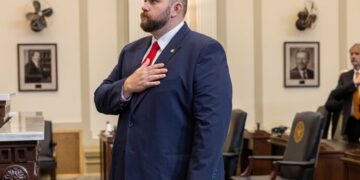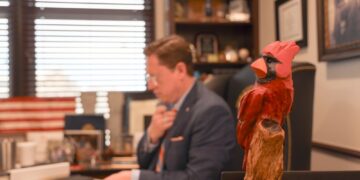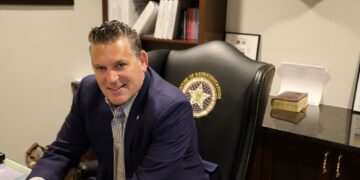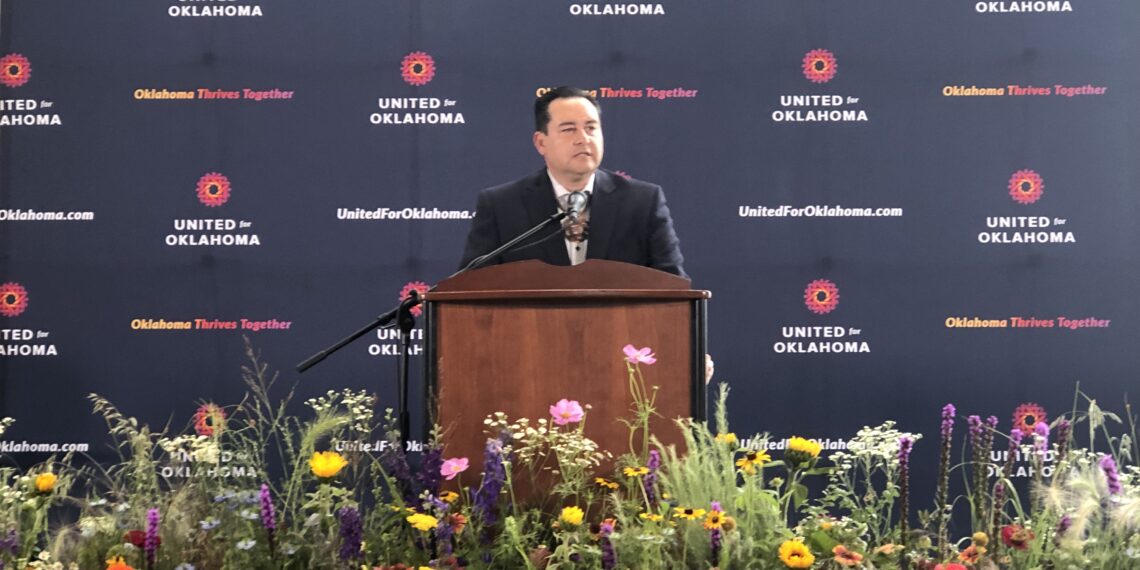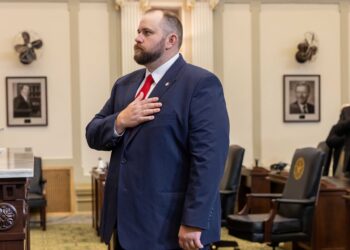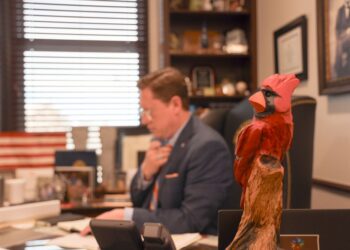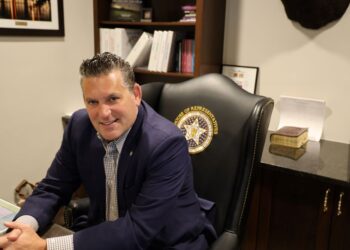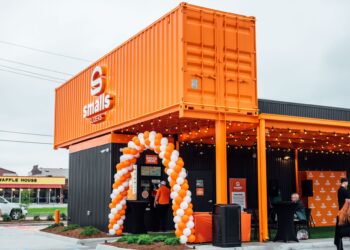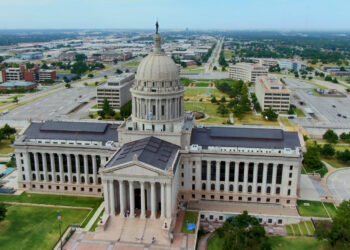OKLAHOMA CITY (OBV) – Leaders of Oklahoma’s First American tribal nations gathered to celebrate the results of an economic impact study which found that the tribes contributed $23.4 billion to Oklahoma’s economy in 2023.
Matthew Morgan, chairman of the Oklahoma Indian Gaming Association (OIGA), presided over the gathering at the Oklahoma History Center in Oklahoma City on Wednesday.
“This report shows us what we’ve always known, that tribal governments are not only cultural and community leaders. They’re economic engines,” Morgan said.
Chad Warmington, President and CEO of The State Chamber of Oklahoma, said the tribal nations’ countless contributions to Oklahoma cannot be understated.
“I deeply value the vital and growing impact of Oklahoma’s tribal nations — not only as economic powerhouses contributing more than $23.4 billion to our state’s economy in 2023, but as essential partners in strengthening our education system, workforce, and health care infrastructure,” Warmington said. “From tribal colleges and scholarship programs to innovative training, health services, and research collaborations, these partnerships are shaping the future of our state. I am excited to see this momentum continue and proud to work alongside our tribal nations for growth that benefits not just our tribal partners but all Oklahomans and every Oklahoma business.”
United for Oklahoma and the OIGA commissioned the study.
Nineteen tribes participated in the study, which was conducted by Dr. Kyle Dean, professor of economics and director of the Center for Native American and Urban Studies at Oklahoma City University.
The study analyzed economic data from the 19 tribal nations that participated in the study and found the following contributions from 2023:
- Oklahoma contributed $23.4 billion to the state’s economy, a 27 percent increase in real dollars from the last economic impact report four years ago.
- Tribal economic activity rose $4.9 billion from Fiscal Year 2019 to Fiscal Year 2023, nearly double the increase recorded from FY 2017 to FY 2019.
- Tribes directly employed more than 55,600 Oklahomans.
- Tribes supported 139,860 jobs to tribal citizens and non-citizens, accounting for over $7.8 billion in wages and benefits to Oklahoma workers.
- Tribes spent $582 million providing health services to Oklahomans with over 3.5 million unique patient visits.
- Tribes sent $208 million in exclusivity gaming fees to the state — a 36 percent increase since 2019. More than $177 million of the fees went to fund public education across Oklahoma.
- Tribes delivered $351 million for Oklahoma education programs in 2023, when combined with the education portion of exclusivity fees.
The 2023 study is the fourth Oklahoma tribal nations impact report from Dean. He said he is not surprised by the tribes’ enormous contributions to Oklahoma.
“The impact is extraordinary. But it no longer surprises me. The level and growth of impact is consistent and persistent, indicating that tribal contributions to the state are both reliable and enduring,” Dean said.
Tribal nations’ contributions to Oklahoma go beyond economic growth, Morgan said.
“That economic impact is only part of the story. Tribal nations are investing in long term growth — health care systems, schools, broadband access, workforce development programs,” Morgan said.
The Oklahoma leaders of several tribes spoke about their respective tribe’s economic growth and contributions to Oklahoma through job creation, workforce support, healthcare and community investment. Those leaders are as follows:
- Governor Bill Anoatubby of the Chickasaw Nation
- Principal Chief Gary Batton of the Choctaw Nation of Oklahoma
- Chief Billy Friend of the Wyandotte Nation
- President Deborah Dotson of the Delaware Nation
- Chairman Jacob Keyes of the Iowa Tribe of Oklahoma
- Chairman Rocky Barrett of the Citizen Potawatomi Nation
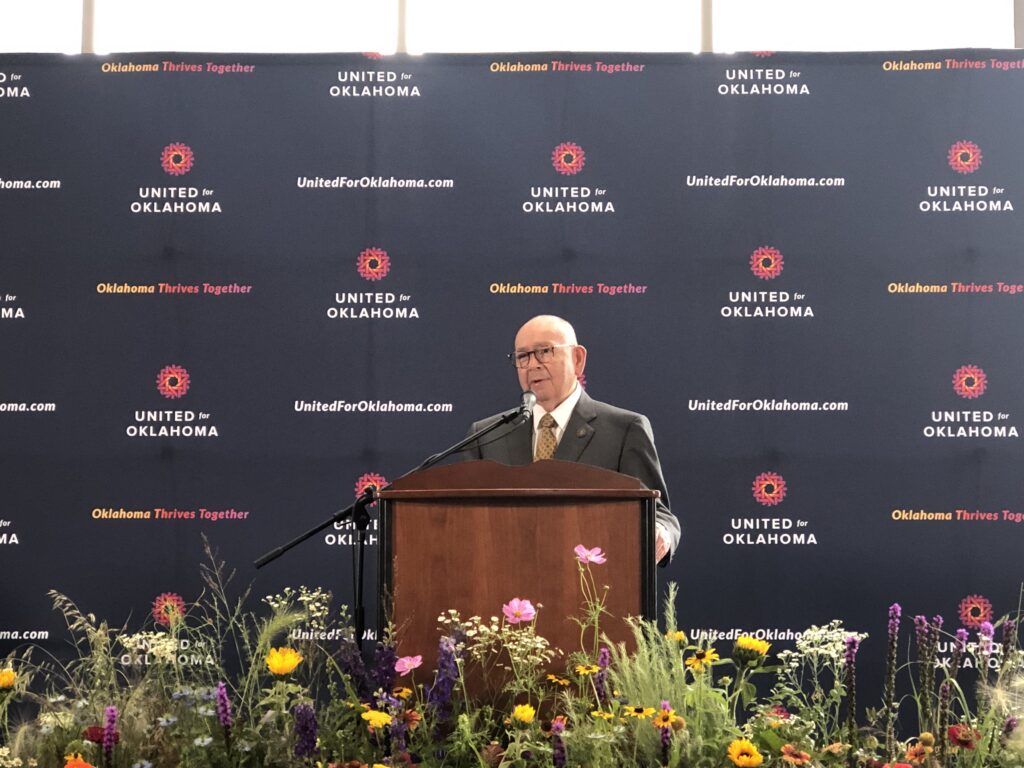
Anoatubby said Dean’s report tells a story of shared success.
“Economic development has helped pave the way for increased self-sufficiency and tribal programs,” Anoatubby said. “Growing our economic foundation supports our mission to serve tribal citizens and members, as well as helping our neighbors.”
The Chickasaw Nation operates more than 100 diverse businesses, including banking, industrial water purification, health care, communications, tourism, luxury hotels, venture capitalism, government contracts, according to Anoatubby.
OKANA Resort & Indoor Waterpark is the Chickasaw Nation’s biggest business enterprise yet.
The $400 million resort opened this year at 639 First Americans Blvd., in Oklahoma City. It has a 100,000 square-foot indoor waterpark, a massive outdoor waterpark, an 11-story-tall luxury hotel containing 404 guest rooms, and a slew of restaurant and entertainment options.
“OKANA offers a unique blend of entertainment, hospitality and culture that will establish it as a world class international tourist destination as well as an economic driver for the area,” Anoatubby said.
The resort has been open for only a few months, so its economic impact is not included in the new report, but Anoatubby said its impact will be evident in the next report.
“We expect OKANA and other tribal-led cultural tourism destinations will significantly contribute to the economic landscape and add to the already increased tourism industry in Oklahoma for years to come,” he said. “Tourism not only fuels economic growth, but it also helps preserve our culture and showcases our people.”
Batton touted the Choctaw Nation’s contributions to workforce.
The Choctaw Nation has around 230,000 tribal members and a reservation that encompasses about 11,000 square miles.
“We have supported over 20,142 jobs within the Choctaw Nation. We provided $1 billion in wages and benefits to Oklahoma workers,” Batton said. “That’s important because that’s tax dollars that’s going back into the state and going back into our communities.”
The Choctaw Nation is investing in Oklahoma, according to Batton.
“Just over the last four years, we’ve exceeded $1.2 billion in investments and that includes a variety of projects across our various sectors, including sustainable agriculture, food sovereignty, housing, water and other infrastructures,” he said.
The Choctaws are also making significant contributions to housing. The tribe built more than 1,500 homes and invested $153 million in new housing developments since 2019, and plans to invest another $50 million annually to construct 240 new homes per year, according to Batton.
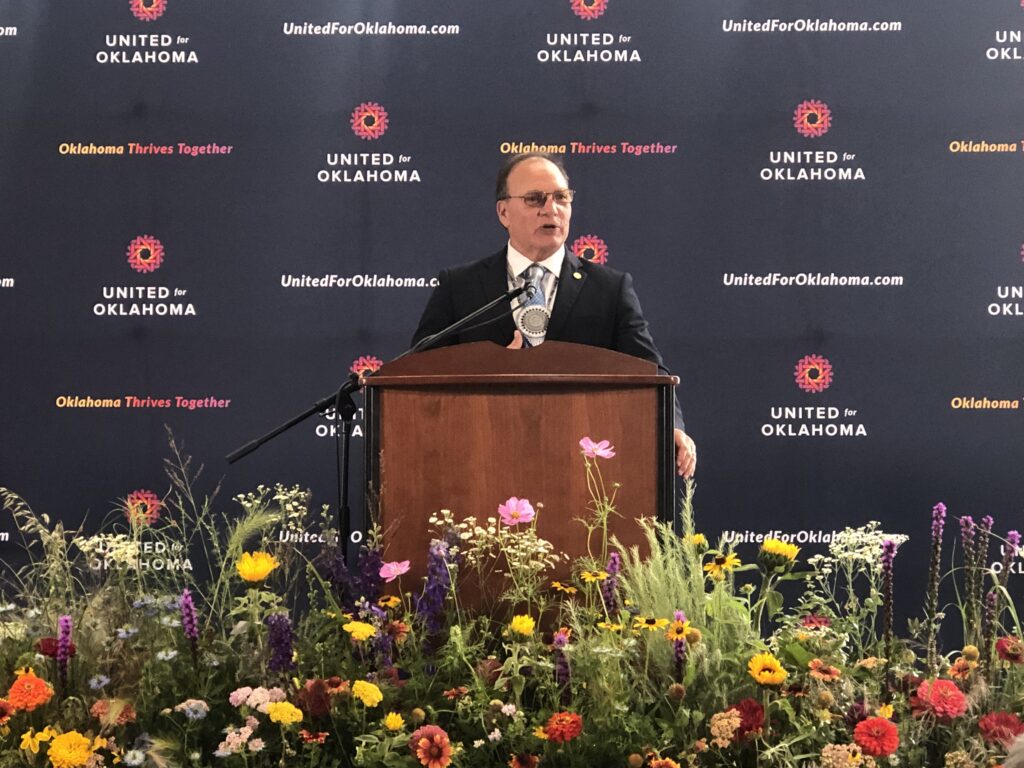
Batton said his tribe is also investing several tens of millions of dollars into health care infrastructure, job creation, small business, agriculture, food services, nature, tourism and voter education.
Tribal contributions in economic development, infrastructure, health care and child care, as well as in many other areas, make a difference in lives throughout Oklahoma, Morgan said while speaking with Oklahoma Business Voice.
“I think everyday Oklahomans can can take some pride in knowing that we’re pulling the rope in the same direction to improve everyone’s lives,” he said.
The tribal nations are primarily associated with gaming casinos when it comes to doing business in Oklahoma, but their economic contributions are vast, varied and growing, Morgan said.
“I think our casinos do a great job at what they do, and they provided some much needed revenue to allow us to participate in that gamut of industries that you reference, whether it’s health care, other economic endeavors, education, housing,” Morgan said. “We know we’re looking across the board at all economic activities to try to say, ‘How do we gather funds in order to improve our citizen communities’ lives?’ But for a lot of Oklahomans, they would be surprised at just how diverse and widespread those economic activities are within the tribes.”
The tribes will continue to diversify their business capabilities and become increasingly involved in a wide range of industries in the next 10 years, according to Morgan.
“We’ve seen [the tribal nations] grow and become more sophisticated every year as as their business portfolios grow. I don’t expect to see anything different. If you’re seeing industries grow regionally, nationwide or worldwide, there is a conversation talking about that subject and trying to figure out how do I participate in that industry,” he said. “Over the next 10 years, I think we’ll continue to be astonished about what strides [Oklahoma’s tribal nations] make and what great partners they’ve shown themselves to be and will continue to be for anybody wanting to improve lives here in Oklahoma.”
The film and television industry is growing in Oklahoma, and the tribal nations are doing their part to strengthen that effort.
The Cherokee Nation cut the ribbon on a second soundstage at its Cherokee Film Studios campus in Owasso last year. The Chickasaw and Choctaw nations are also getting in on film and television production, producing their own films and offering shooting locations. It’s just the beginning, Morgan said.
“Tribal governments are interested in that. They’re interested in telling their story,” Morgan said. “We have lots of land, we have lots of locations, we have lots of citizens in. As Oklahoma’s film industry continues to grow, I think you’ll continue to see a growing presence of tribal interest in that segment as well.”
Rep. Scott Fetgatter, R-Okmulgee, is a member of the Choctaw Nation and serves as House Leader of Tribal and External Affairs. He released a statement highlighting the findings of the economic impact study and praised the tribal nations for their continuing efforts to grow the state’s economy.
“The positive impact of our tribal nations has long been known in Oklahoma,” Fetgatter said. “This report gives concrete data to show just how significant that impact is to all of the people who call our state home – whether that be through stable and secure housing, good-paying jobs, education, health care services, contributions to our states infrastructure or much more. That’s not even accounting for the cultural enrichment the tribes bring to our state. I’m grateful for the relationship we have with the leaders and citizens of our tribal nations.”
The tribal nations have had a difficult relationship with Gov. Kevin Stitt, frequently disagreeing with Stitt’s ideas on tribal compacts. Stitt is currently serving his second and final term as governor.
Oklahoma House of Representatives Democratic Leader Cyndi Munson, D-Oklahoma City, is running for governor. She attended the event on Wednesday and lauded the tribal nations’ contributions to Oklahoma. She said the economic impact report highlights the importance of the relationship between the state and the tribes.
“There’s no denying the impact that tribes have on our state. I appreciate their shared vision. All the tribal leaders talked about taking care of people and not just their tribal members, folks in their community, even if they’re non tribal members. I’m very grateful for that type of leadership and mentality and vision,” Munson said. “I know I personally will continue to strengthen my partnership and relationship with the tribes, and I hope we do that as a state, as a whole.”
Munson said she will work to build a strong, fruitful relationship with the tribes if she is elected governor.
She said she would sit down with the tribes and discuss priorities, listen to their ideas and honor the work they are doing to develop Oklahoma’s economy and help Oklahomans.
“Each of these tribal leaders are friends of mine. As a legislator and as a person, I look up to them as mentors and leaders for me and how I can do my job better now as a legislator and the opportunity to be governor,” Munson said. “We share those values, and I think that’s a great place to start.”
Communication is key to the next governor having a good relationship with the tribes, Morgan said.
“As long as they’re willing to sit down across the table and have open, honest and respectful conversations, you’re going to see tribal leadership want to engage in those conversations,” Morgan said. “Communication is so key in both personal and professional relationships. And I think the next governor, as long as they recognize those contributions that tribes are making — and that’s all 38 tribes across the state — and are open to having conversations with the basic question of how do we improve all Oklahomans lives, I think we’ll we’ll be off to a great start and get to bigger and better things together.”


